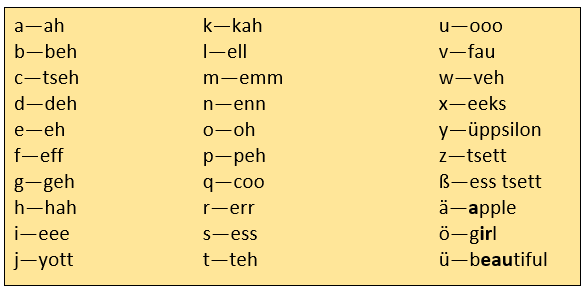10 Section 1-10: The Alphabet (das Alphabet)
1-10: The Alphabet (Das Alphabet)
You already know how most of the letters in the German alphabet are pronounced. Here is the official German alphabet. It has the same 26 letters that English has with four additional letters: ä, ö, ü, and ß.

Listen to the alphabet here. Audio courtesy of Light Bulb Languages, https://www.lightbulblanguages.co.uk/
Notes on pronunciation:
Here are a few differences from English, which have not already been mentioned in previous sections.
- J is pronounced like English “y”.
- L is pronounced slightly different from English with the tongue touching the back of the teeth.
- ß is pronounced like a double “ss”. It is never found at the beginning of a word.
- Ä is pronounced like the “a” in “apple” or the “e” in “ever.”
- Ö is pronounced like the “ir” in “girl” except with less of an “r” sound.
- Ü is pronounced similar to the “eau” in the word “beautiful” but with rounded lips.
Video. Watch YourGermanTeacher’s video to hear the alphabet.
Video. Watch Easy German’s video to hear the alphabet with examples for each letter.
You will learn more rules for pronunciation as we get to them in this textbook, but if you want to learn all about pronunciation, watch YourGermanTeacher’s video to get ahead.
EXTRA PRACTICE:
Go to Deutsche Welle and practice your pronunciation of all German sounds and vowel combinations with interactive exercises.
Ex. A: Abkürzungen. Practice saying the following abbreviations out loud in German.
- USA 10. CDU
- BMW 11. SPD
- VW 12. DAAD
- EU 13. DFB
- FKK 14. EKD
- DVD 15. FDP
- NRW 16. ICE
- GmbH 17. LKW
- DDR 18. RTL
QUICK LISTENING PRACTICE: Listen to Mara, Luis, und Nico spell their favorite band’s and singer’s names. (Audio courtesy of AudioLingua.)
Ex. B: Buchstabieren Sie bitte! With a partner, practice spelling the following German words out loud.
A: Wie schreibt man Tisch? (How does one write “Tisch”?)
B: T-I-S-C-H.
- Stiefbruder 8. Tasche
- Mutter 9. Computer
- Vater 10. Wetter
- Halbschwester 11. kritisch
- Großmutter 12. Geburtstag
- Tante 13. Psychologie
- Onkel 14. Dezember
EXTRA PRACTICE: Hörverständnis—das Alphabet. Go to Germanzone.org’s website and listen to the cities being spelled aloud. Choose the one that corresponds to what you hear.
- https://www.germanzone.org/horverstandnis-das-alphabet-orte/.
- https://www.germanzone.org/horverstandnis-das-alphabet/.
- https://www.germanzone.org/horverstandnis-das-alphabet-faecher/.
Ex. C: Video. Nicos Weg. Folge 4. Von A bis Z. Watch the video and do the online activities.
So far, you have learned the basics of introducing yourself in this chapter. In the next episode of Nicos Weg, you will learn some alternatives to “Ich heiße…”
- Ich heiße ______. I am called ______.
- Mein Name ist _____. My name is ______.
- Ich bin ______. I am _______.
- Wie heißen Sie?/Wie heißt du? How are you called?
- Wie ist Ihr Name?/Wie ist dein Name? What is your name?
- Wer sind Sie?/Wer bist du? Who are you?
Ex. D: Video. Nicos Weg. Folge 5. Ich heiße Emma. Watch the video and do the online activities.
https://learngerman.dw.com/en/ich-hei%C3%9Fe-emma/l-37262882.
Listen to Die fantastischen Vier’s song, MfG, (1999) to practice the alphabet. The song contains many abbreviations found in the German language. The lyrics are in the video.

